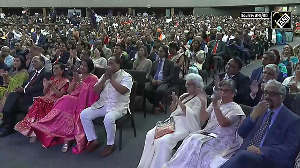Even as the Bharatiya Janata Party is all set to form a government in Bangalore with the help of independents, the Congress has been downplaying the national implications of the Karnataka verdict.
The BJP victory does not come as a surprise for it had won 28 per cent of the voteshare and 79 seats in 2004. Since then the Lingayat community, making up 17 per cent of the state's population, had consolidated behind B S Yedyurappa who they felt had been wronged and denied his rightful stint in power.
Except in southern Karnataka, the fight was essentially bipolar between the BJP and the Congress and both have increased their vote share and seat tallies. This shows that the people wanted a clear verdict, a stable and performing government. But a larger number of people opted for the BJP, in order to 'try them out', reminiscent of the 1998 national verdict in favour of Atal Bihari Vajpayee.
Coverage: Battleground Karnataka
The first implication of the verdict is that it has pushed any chance of advancing the general elections to this winter. The Congress would not like to take the risk of curtailing its term, with the price situation being what it is. There was a group in the Congress backing going ahead with the Indo-US nuclear deal and inviting winter elections, if the party managed to form a government in Bangalore. A meeting of the UPA-Left parties is slated for May 28 to take a decision on how to move forward on the nuke deal.
Two, we can expect more measures from the Government to bring prices under control. The stakes are too high to ignore the southern verdict, with Hindi heartland elections later this year.
Three, parties like the All India Anna Dravida Munnetra Kazhagam may look afresh at rejoining the BJP-led National Democratic Alliance. More so since the BJP has won the southern state without emotive issues of the temple variety it usually relies on, though the Jaipur blasts are believed to have given a final push to the party in north Karnataka in the third phase.
Winning the polls on planks of development and governance and a declared leader may also strengthen the hands of BJP prime ministerial candidate L K Advani to position his party as a right of centre entity and make it attractive for potential allies. That's the fourth implication of the verdict and it may influence party strategy and electoral programmes in other states.
Implication five is the pan Indian character the Karnataka win confers on the BJP. The party is already in government in several states in the north east of India and now it has a government in the south.
It goes without saying that it will put new heart into the BJP cadre to gear them up for the important electoral battles that lie ahead.
Conversely, it will affect Congress morale. Barring Haryana, the party has not won any state election in recent months. Losing Karnataka which has been a Congress bastion and a state that stuck by Indira Gandhi even in the post-Emergency 1977 elections, comes as a major setback. The ruling party has attributed the defeat to a division in the secular vote. It may well move towards an alliance with the considerably weakened and hopefully chastened Janata Dal-Secular and the Samajwadi Party for the 2009 general elections.
While the BJP has surged ahead, increasing its vote share. It could have got a clear majority had it swept in the Bangalore area, which accounted for 28 seats this time after delimitation. A goof up in ticket distribution and a lacklustre campaign may explain the surprisingly low voter turnout in Bangalore.
Though all the three parties -- Congress, JD-S and the BJP -- were in power at one time or another during the last four years, the incumbency was against the JD-S, whose vote share and seat tally slumped. It is a lesson for all regional parties that they cannot take even captive, caste-based vote banks for granted.
The Congress still has a following among its traditional vote-bank carved out by Indira Gandhi under the leadership of Devraj Urs of OBCs, Dalits, minorities and some upper castes. The trouble is that the Congress' standing is not what it used to be. The Congress has rarely announced its chief ministerial nominee in advance. In Karnataka its leadership did not put its best foot forward nor did it move in step.
The Congress will have to bring forward new Dalit, OBC, minority and women's faces in leadership roles. Karnataka has shown that people want a break from the past. They are looking for something that is new and fresh.






 © 2025
© 2025